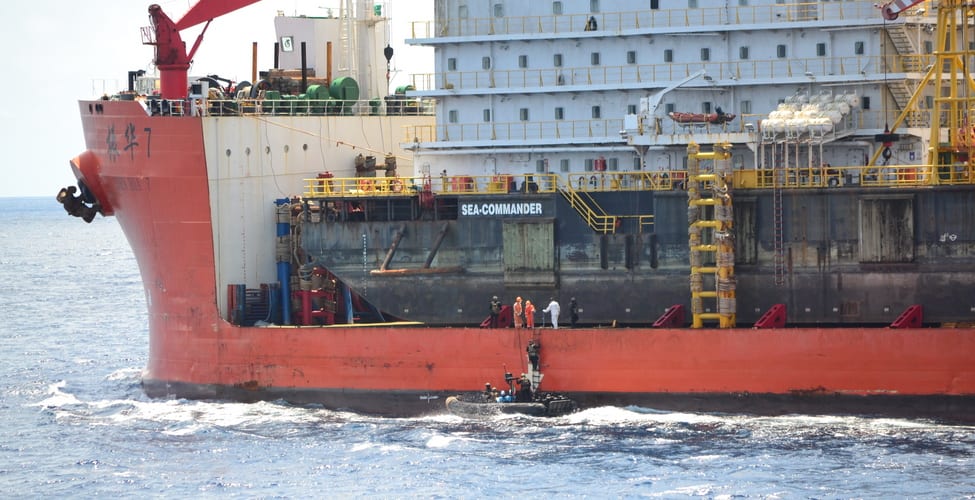Starmer Confident Aukus Pact Will Proceed Despite Trump Review
By Ellen Milligan Jun 15, 2025 (Bloomberg) –UK Prime Minister Keir Starmer said he has no doubts that the Aukus defense pact with the US and Australia will continue despite President...

By Libby George
LAGOS, Jan 25 (Reuters) – Pirates are stepping up attacks on ships in West Africa’s Gulf of Guinea, defying regional navies. On Saturday, pirates off Nigeria kidnapped 15 sailors from a Turkish container ship and killed one.
Pirates in the Gulf of Guinea kidnapped 130 seafarers in 22 separate incidents last year, accounting for all but five of those seized at sea worldwide.
WHO ARE THE PIRATES AND WHY ARE THEY ATTACKING?
The pirates come from Nigeria’s turbulent Niger Delta, experts say. The region produces the bulk of the nation’s petroleum, but is woefully underdeveloped, scarred by pollution and has some of the highest unemployment in the country.
Bands of men desperate for money engage in a variety of illegal but lucrative activities, including kidnapping, stealing and refining oil, and piracy.
They often bring the kidnapped crew to the creeks that snake through the swampy region.
WHY ARE THE PIRATES KIDNAPPING MORE SAILORS?
The International Maritime Bureau has tracked a steady increase in kidnappings over recent years, affecting everyone from fisherman to international supertanker crew. Pirates who once stole cargo, or siphoned oil, discovered that some companies will pay large sums to ransom kidnapped crew.
Last year’s oil price crash and Nigeria’s second recession in five years worsened unemployment and economic hardship.
Max Williams, chief compliance officer for security firm Africa Risk Compliance, said Saturday’s attack reflects yet more risk.
“Breaching the citadel and killing a crew member is a serious escalation,” Williams said.
Williams added that attacks further out to sea – Saturday’s attack took place 200 nautical miles offshore – reflected increasing sophistication, as vessels further from shore are less likely to have naval protection.
WHAT IMPACT ON TRADE?
The Gulf of Guinea borders more than 20 countries. The waters are the key route in for everything from steel to soda in a region that relies heavily on imports, and the main export avenue for oil, cocoa, and other commodities.
Ships still ply the lucrative route, but at a cost. Jakob Larsen, head of security withshipping trade association BIMCO, said insurance costs rise due to attacks, and freight rates are more expensive as some ships avoid the region, cutting the number of available vessels.
Kidnapping and ransom insurance can also cost shipping companies several million dollars annually, though most refuse to discuss specifics due to fears it could make covered vessels a target.
Such costs are typically passed to consumers, and Larsen said there are also high indirect costs due to business and investment that fail to materialize.
WHAT RESPONSE HAS THERE BEEN?
In 2013, 25 countries in the region developed the Yaounde Code, which established coordination on piracy and other maritime crimes.
Nigeria has its own “Deep Blue” initiative to develop maritime surveillance and security, and last year secured its first conviction under a new anti-piracy law.
Most countries in the region bar international navies or armed private security staff from their waters.
Foreign navies, such as France, Spain and Italy, already patrol the region’s international waters, but BIMCO said there is an “urgent need” for a coordinated international law enforcement operation.
Denmark’s A.P. Moller Maersk, the world’s biggest container line, agrees.
“International mandates were found to secure the Hormuz Strait and the Indian Ocean,” said Aslak Ross, Maersk’s head of marine standards. “So we ought to be able to find a mandate in West Africa.” (Additional reporting by Jacob Gronholt-Pedersen in Copenhagen; Editing by Giles Elgood)
(c) Copyright Thomson Reuters 2021.
Sign up for gCaptain’s newsletter and never miss an update

Subscribe to gCaptain Daily and stay informed with the latest global maritime and offshore news


Stay informed with the latest maritime and offshore news, delivered daily straight to your inbox
Essential news coupled with the finest maritime content sourced from across the globe.
Sign Up